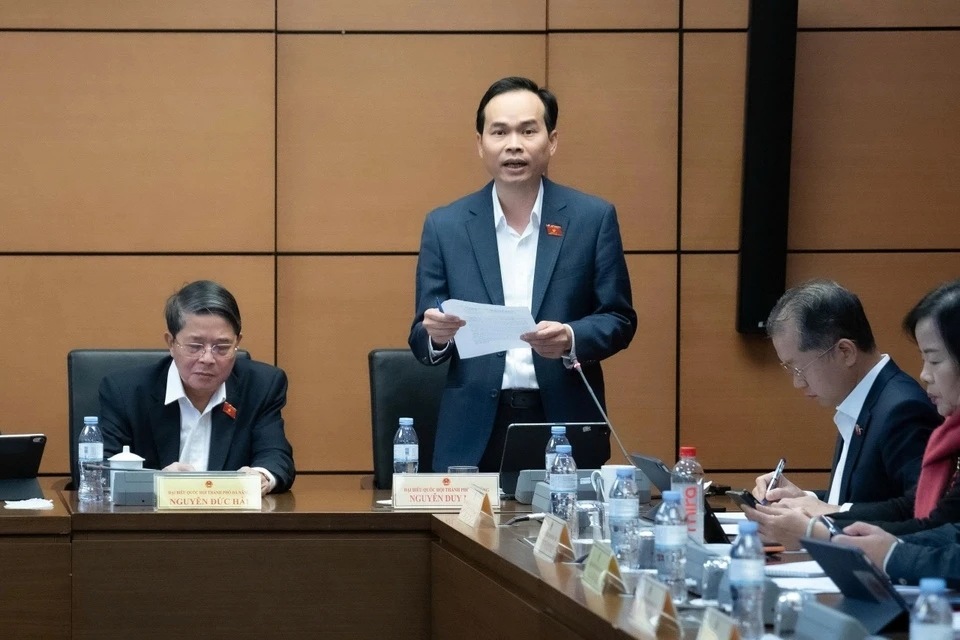Specific solutions are needed to strengthen people's trust in compulsory insurance
Discussing in groups at the 10th session of the 15th National Assembly on draft laws, including the draft Law amending and supplementing a number of articles of the Law on Insurance Business, National Assembly Delegate Nguyen Duy Minh (Da Nang Delegation) said that the payment of compulsory civil liability insurance compensation for motor vehicle owners is an issue of particular concern to voters.
According to Mr. Minh, through research on data, the current payment rate is very low, which has been mentioned many times by delegates at previous sessions.
"According to statistics up to November 2024, revenue from this type of insurance reached 736 billion VND, but the total amount of payment was only about 28.5 billion VND, equivalent to 4%. This figure is much lower than international practice in the field of compulsory civil liability insurance for motor vehicle owners," Mr. Minh cited.
With such a low payment rate, the National Assembly Delegate said that people's trust in compulsory health insurance is declining. Many voters suggested that it is necessary to study the removal of mandatory regulations, because the assessment and determination of damage by insurance companies is still un object.
Voters also hope to have an independent appraisal mechanism to ensure that the value of damage and the compensation level are determined more fairly and appropriately.

Delegate Nguyen Duy Minh added that although the Ministry of Finance has adjusted the regulations, in reality, people still have to wait 1-2 months to receive compensation.
The draft Law on Insurance Business (amended) mentioned the reduction of administrative procedures, but according to Mr. Minh, these changes only facilitate management and have not really resolved the problem of payment to people.
From the above reality, Mr. Minh suggested that the Ministry of Finance should have specific solutions in guiding documents under the law to remove shortcomings and strengthen people's trust in compulsory insurance.
At the same time, he proposed that the Ministry of Finance should publicize the compensation ratio and the number of cases paid on the Ministry's Electronic Information Portal, making it easier for people to monitor and supervise.
"Information transparency not only helps strengthen people's trust, but also contributes to raising awareness of complying with traffic laws. When risks occur, insurance participants need to have their rights guaranteed in a commensurate and fair manner," Delegate Nguyen Duy Minh emphasized.
Current compulsory motorbike insurance has not really played a role
In an interview with Lao Dong Newspaper, lawyer Hoang Tung (Institute for Legal Policy Research and Development) said that the current compulsory motorbike insurance type has not really promoted its role and purpose of ensuring the rights of participants. The main reason lies in the complicated compensation process and procedures, causing difficulties for beneficiaries.
According to current regulations, when a traffic accident occurs, the motor vehicle owner must immediately notify the insurance company; at the same time, actively treat and limit damage to people and property, protect the scene and report to the police or local authorities.
In particular, insurance participants must complete the compensation application including: driver's license, discharge certificate, medical records, repair and replacement invoices at the facility designated by the insurance company...
"All such documents must be legal before the insurance agency can make the payment. This makes the procedures very cumbersome, causing great obstacles for people", lawyer Hoang Tung analyzed.
According to Mr. Tung, the reality shows that the purchase of compulsory civil liability insurance has not achieved the goal of protecting the rights of participants, while there is a risk of violations and insurance fraud.
"Instead of forcing people to buy civil liability insurance, authorities should consider amending regulations, moving towards eliminating the requirement, while at the same time developing a suitable roadmap to implement a voluntary, transparent and more effective insurance policy," he proposed.











